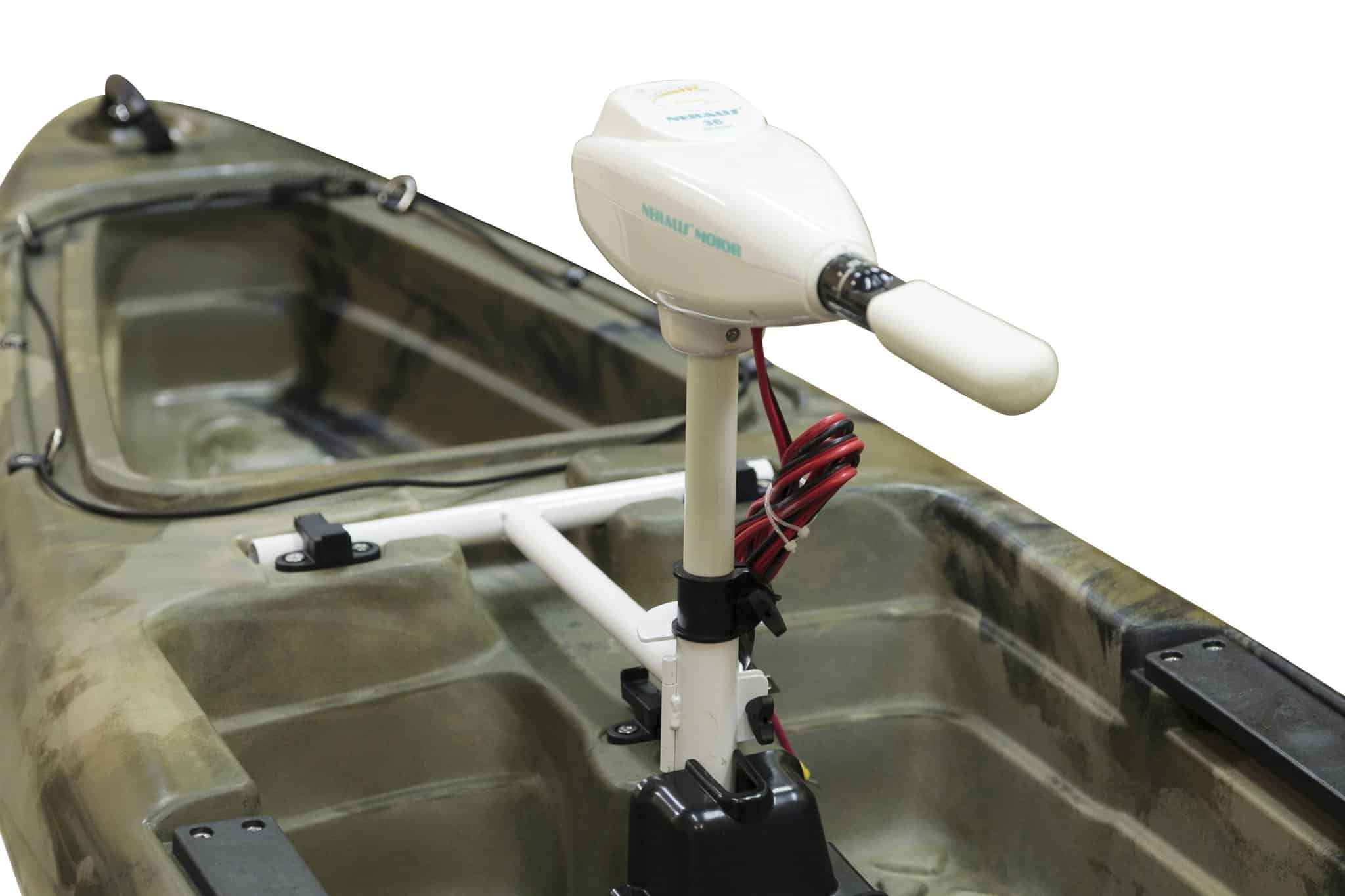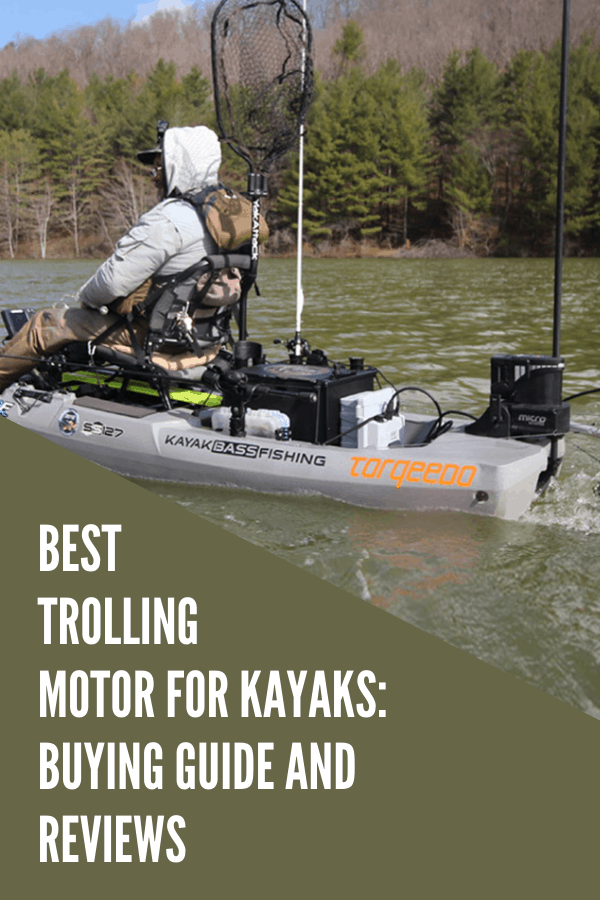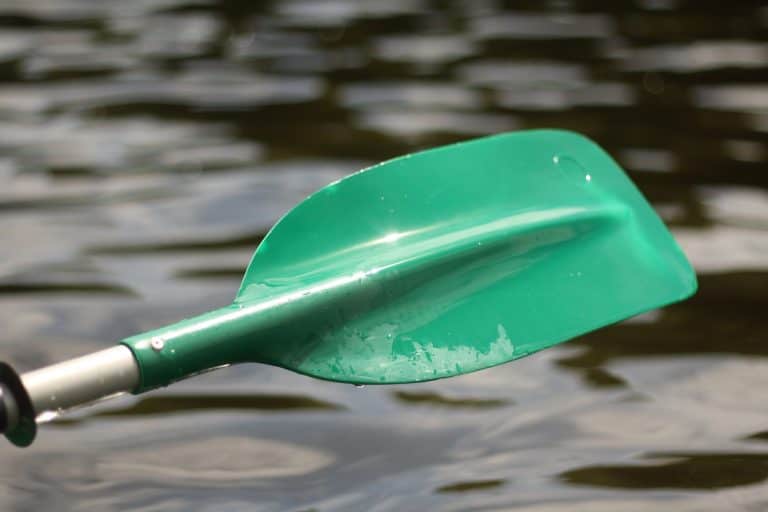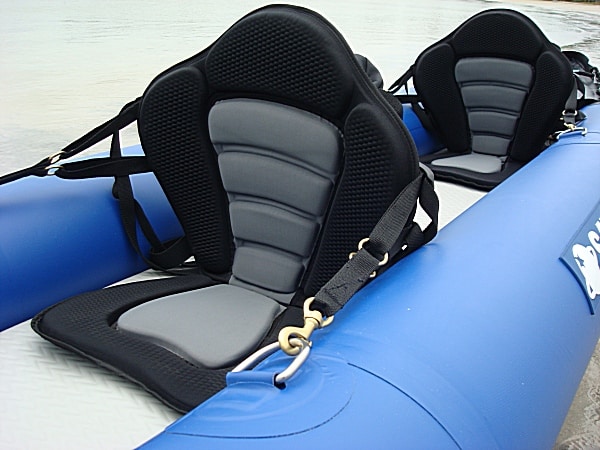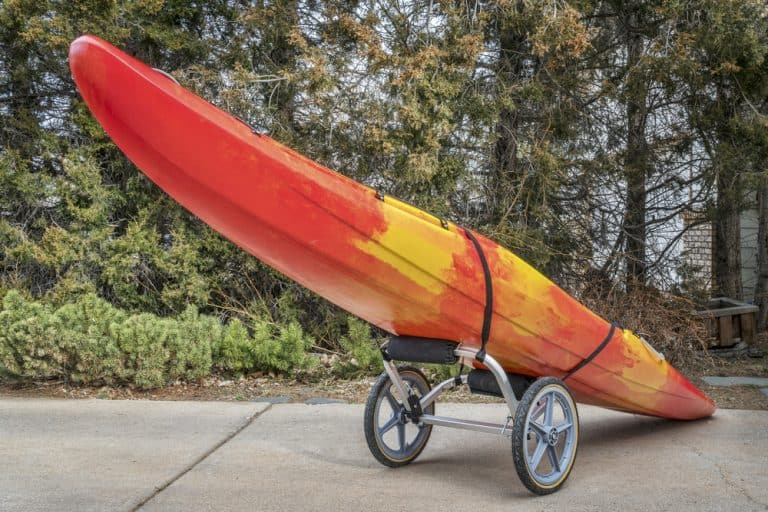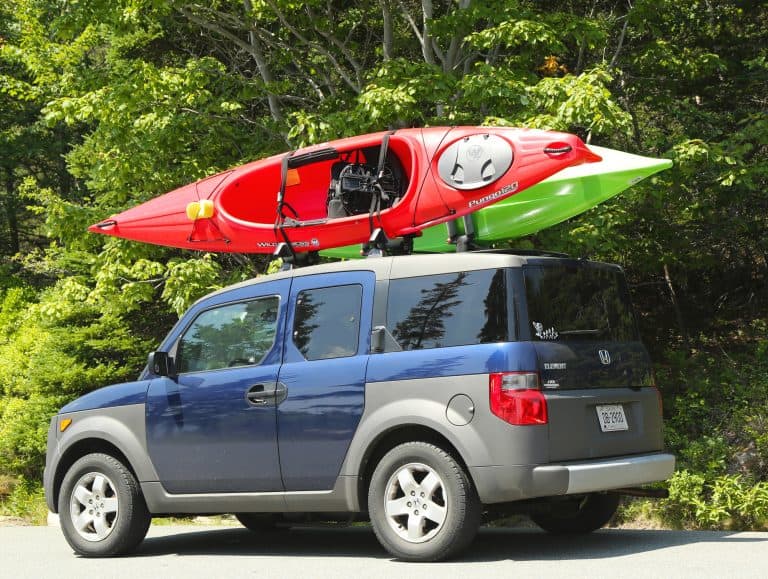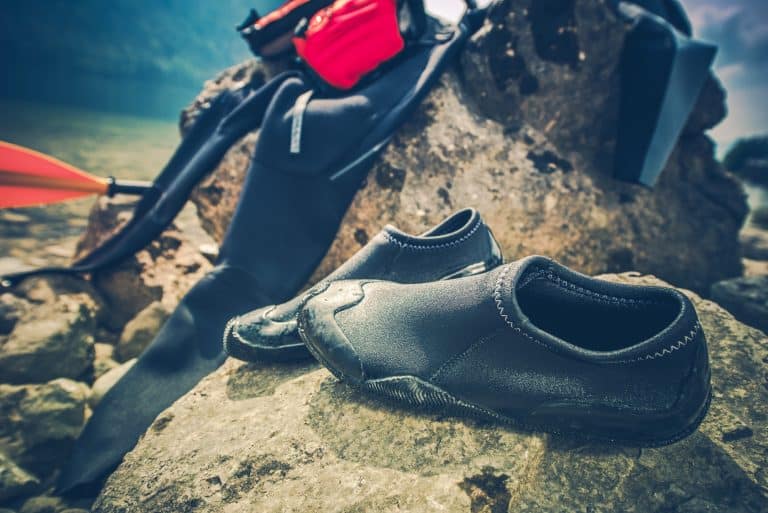You’re ready to tackle kayak fishing, and you’ve got the right kayak, the perfect rod and reel, and the ideal PFD. And just as the sun is starting to rise from the water, you slip your ”˜yak into the water at the launch.
Then the paddle begins, and by the time you make it to your honey hole, it’s mid-morning.
For anglers who need to cover a lot of distance, a trolling motor is ideal. Small, powerful, and quiet, these electric motors are beginning to find a place in the kayaking world.
But selecting the right trolling motor takes some expertise. To help, we’ve assembled the following buying guide and some of the best kayak trolling motors for sale in the market.
Best Kayak Trolling Motors
- ”‹Newport Vessels Kayak Series 55 Lb. Thrust Trolling Motors”‹ – Editors Choice
- ”‹Minn Kota Endura C2 30 Trolling Motor
- ”‹Minn Kota Riptide 45 Lb. Trolling Motor
- ”‹Minn Kota Traxxis 55 Lb. Trolling Motor
- ”‹Saturn 55 Lb. Short Shaft Trolling Motor
- ”‹Goplus 46 and 55 Lb. Thrust Trolling Motors
- ”‹Haswing W20 20 Lb. Trolling Motor
What to Consider When Choosing a Trolling Motor for a Kayak
What Is a Trolling Motor?
A trolling motor is a small, quiet electric engine that’s used to maneuver without scaring fish. It’s usually mounted on the bow of bass boats, where it can be operated by foot while fishing.
Rather than fire up a loud outboard to move a few feet or fight the wind, a trolling motor allows anglers to make fine adjustments in virtual silence. Check out this video on how a trolling motor is used.
Why Would a Kayaker Want One?
Though designed for traditional fishing boats, trolling motors offer kayakers a number of advantages.
- They’re fast”‹ – Anglers need speed, and they want to get where they’re going. It can be miles to where they need to fish, and this isn’t a recreational paddle. For die-hard fishermen, getting quickly to where the fish are is important, and trolling motors are much faster than paddling.
- They’re quiet”‹ – Unlike gas outboards, trolling motors are nearly silent. You can use a trolling motor on a kayak to approach fish without frightening them. You can see just how quiet they are in this video:
Power
Keeping in mind that these motors are designed for boats that weigh more than 1,500 pounds, you won’t need to worry about being under powered in your ”˜yak!
- 2 pounds per 100 pounds of loaded weight is the rule – Trolling motors are intended to move something the size and mass of a bass boat, and the power they generate reflects that. Unlike outboards, a trolling motor’s thrust is measured in pounds rather than horsepower, and for a kayak, even the puniest electric trolling motors will provide more than enough thrust. ”˜Underpowered’ is simply not a problem!
- More thrust won’t help. Unlike the hull of a speed boat, your ”˜yak isn’t designed to plane, or to ride up on the water as it increases speed. As a result, it’s going to top out pretty quickly, no matter how much motor you have. Your specific top speed will depend on a number of factors, but it’ll be faster than you can paddle.
Batteries
Trolling motors are electric engines and they take power systems in multiples of 12v: 12v, 12/24v, 24v, and 36v. More electricity is required to run more powerful trolling motors, and a 24v system requires two 12v batteries, whereas a 36v system obviously takes three.
But given the thrust to weight ratio on a kayak, you can stick with simple 12v systems that demand a single battery.
Perhaps most importantly, you’ll want a motor that sips electricity, keeping your battery alive for as long as possible.
Mounting System
This is where things can get a bit complicated.
Trolling motors are designed primarily for bow mounting on a bass boats, and many designs use a sliding hinge to allow them to be quickly raised and lowered into the water. For kayakers, this simply won’t work.
Instead, you’ll need to look for a transom mounting system that fits the scuppers behind your cockpit. These are adjustable to fit most kayaks, and they provide a solid bar on which to mount your new motor.
It’s best not to mess with a bow mount on a ”˜yak. That configuration allows anglers in a bass boat to operate the trolling motor from the front captain’s chair or while standing on the deck, but it doesn’t add functionality for you.
Shaft Length
This, too, is tricky for kayakers. The shaft between the engine and propeller on trolling motors tends to be long so it can stretch from the gunnel of a bass boat to the water below, keeping the propeller constantly submerged.
For kayaks, those long shafts are a problem, and in these reviews, we’ve selected products that have the shortest shafts we could find. But there are some things to keep in mind.
- The propeller needs to be under water. You need to keep that propeller 12 inches under water to stop it sucking air from the surface and making a lot of noise. Unfortunately, the guides you’ll find to figure this out don’t have kayakers in mind.
- Careful measurement is key. Here’s what kayakers need to do. After you attach your mount, you’ll need to measure from its horizontal bar to the surface of the water, add 12 inches, and then add 3-4 inches more in case you plan to be out in rough water. That’s the shaft length you need. For really poor conditions, you might want to add 5-6 inches instead.
Control Type
You’ll find a variety of control systems on the market, and given the intended use of trolling motors, many will offer some form of foot pedal operation. As useful as that is on a bass boat, it’s pretty much useless for a kayak.
- Foot pedals don’t help kayakers. Imagine standing in a ”˜yak equipped with a trolling motor. That engine is designed to provide enough thrust to push a massive boat, and because these are electric motors, they’re going to provide a nearly instant push. On your light kayak, even with you in it, that’s just way to much energy for you to operate and stay on your feet. Moreover, these are designed for bow mounted motors, and the cables aren’t designed to reach from a transom mount to the foot pegs on a kayak.
- You’ll want a tiller handle. If you’d like to stay in your kayak, you’ll want to stay seated while using your motor! While there are expensive remote control options, a tiller handle is the simplest and most popular set up. Check out this video on a transom-mounted tiller-handled trolling motor on a kayak:
Weight
Weight is an issue in a kayak, and you’ll need to keep that in mind. With the battery, the mount, and the trolling motor, you’ll need to keep your kayak’s maximum capacity in mind. You’ll also need to be sure that the stern still rides above the water! For this reason, lighter motors are generally a better choice.
Legalities
Many states require any boat equipped with a engine to be registered, and that includes trolling motors! Check with your local wildlife and fisheries agency and be sure you comply with the law.








Reviews
Our Pick
Best Kayak Fish Finder Overall
”‹Newport Vessels Kayak Series 55 Lb. Thrust Trolling Motors
Shaft Length: 24” – adjustable
Weight: 23 lbs.
Newport Vessels’ Kayak Series is specifically designed with kayakers in mind. This motor offers an impressive 55 pounds of thrust; that’s enough motor for a 2,700-pound boat and more than enough for any ”˜yak!
To translate that energy to the prop, it’s equipped with a 24-inch adjustable shaft, a good length to consider as you start your search for the best motor. That adjustability will come in handy, too, and it’s an important feature to consider.
Like most of its competitors, it comes equipped with a 6-inch telescoping handle and eight speeds: five forward and three reverse.
Unlike older Newport Vessels models, however, customers say that the new throttle positions provide sturdy clicks to let you know when you’ve change gears or turned the motor off. That’s important: trolling motors are quiet enough that at low speeds, you can accidentally leave them on, draining the battery.
Newport Vessels relies on a fiberglass shaft, and the head and prop are designed for saltwater. If lots of time in marshes, estuaries, or near shore is something you anticipate, this is something to consider. This trolling motor is equally at home in creeks, rivers, and lakes, too.
Battery life is reported to be very good, especially at lower speed settings. But perhaps most importantly, when people have had a problem, customer service has proven to be excellent.
PROS
- ”‹Good battery life
- ”‹Excellent customer service
- ”‹Short, adjustable shaft
- ”‹Freshwater/saltwater
CONS
- ”‹Heavy
Minn Kota Traxxis 55 Lb. Trolling Motor
Thrust: 30 lbs.
Shaft Length: 30”
Weight: 17 lbs.
Minn Kota is a trusted name and one of the best trolling motors brand. Their Endura C2 30 shouldn’t disappoint. Offering 30 pounds of thrust, it’s got plenty of power for a kayak. It is designed for freshwater use, so if you plan on saltwater then you might want to give this motor a pass.
That said, plenty of people do take this motor where it’s not intended to go, and if you decide to follow suit, it’s best to always rinse it after use and anticipate some corrosion.
A 6-inch telescoping tiller handle keeps its controls within reach. According to many users, build-quality is excellent and you can expect trouble-free operation.
The Endura delivers power to its prop through a 30-inch fiberglass shaft, and its transmission features the usual eight speeds: five forward and three reverse. A simple twist of the tiller revs up the throttle, and customers rave about battery life even at high speed. That’s something to keep firmly in mind.
As is usual for Minn Kota, quality control is excellent, as is battery life. Moreover, at just 17 pounds, this trolling motor is light, an important consideration on a kayak.
PROS
- ”‹Excellent battery life
- ”‹Short shaft
- ”‹Good build quality
- ”‹Lightweight
CONS
- ”‹Designed for freshwater”‹
Thrust: 55 lbs.
Shaft Length: 36”
Weight: 29 lbs.
The final Minn Kota trolling motor we review is the Traxxis series. Available in 55-pound thrust models, the Traxxis is intended for freshwater only.
Again, that doesn’t mean that it never ends up in the salt, but expect corrosion and reduced service life if you make that choice. With plenty of power for the kayak angler, if you spend your weekends on ponds, lakes, creeks, and rivers, this motor might be a good choice.
Using a 36-inch fiberglass shaft to deliver power to the head, the Traxxis offers a variable throttle identical to the Riptide. That precise control is a nice feature, and it avoids common problems like leaving the nearly silent motor on low and draining the battery. Like its competitors, that tiller handle also extends, keeping you comfortably in control.
As with all Minn Kota trolling motors, build quality is top-notch, and customers brag about long battery life. Tipping the scales at 29 pounds, respectively, these motors are in no sense lightweight, something to note if the stern of your kayak is already riding low in the water.
PROS
- ”‹Excellent battery life
- ”‹Good build quality
- ”‹Continuously variable throttle
CONS
- ”‹Heavy
- ”‹Designed for freshwater
”‹Saturn 55 Lb. Short Shaft Trolling Motor
Thrust: 55 lbs.
Shaft Length: 26”
Weight: 17 lbs.
Last but not least, the Saturn Short Shaft offers 55 pounds of thrust and is designed with kayaks, and inflatables dinghies in mind. It is also the best trolling motor for canoe. Using a Haswing-manufactured engine, these motors are designed for saltwater as well as fresh. Keep in mind, though, that Saturn recommends a thorough rinse after use in saltwater to extend motor life.
Offering a 26-inch composite shaft, this trolling motor provides enough length to submerge its propeller without creating headaches for kayakers.
And with the usual eight speeds, five in forward, three in reverse, you’ll have plenty of control over your speed. It features an extendable handle, too, so there’s no worry about reaching for the throttle while it’s mounted on the transom behind you.
At only 17 pounds, this engine is pretty light, and if that’s a worry for you, this is a good place to start your search for the ideal trolling motor. Some customers complain about quality, but Saturn’s customer service seems to be excellent to make up for it.
PROS
- ”‹Good battery life
- ”‹Freshwater/saltwater
- ”‹Lightweight
- ”‹Short shaft
CONS
- ”‹Poor build quality
”‹Goplus 46 and 55 Lb. Thrust Trolling Motors
Thrust: 46 lbs. and 55 lbs.
Shaft Length: 36”
Weight: 19.4 lbs and 22 lbs.
Goplus offers two versions of this trolling motor. Each features a shaft that’s 36 inches long, though the smaller and lighter model offers 46 pounds of thrust compared to its more powerful brother at 55 pounds. Either is more than enough for a kayak, and for most people in a ”˜yak, the added thrust just means shorter battery life.
Both models come equipped with a 6-inch telescoping handle and eight speeds: five forward and three reverse. The higher speeds will definitely get your kayak going as fast as physics will allow! Unfortunately, some users complain that the detent system on the throttle wears quickly, resulting in ”˜lost’ gears.
Goplus constructs the shaft from fiberglass; it’s tough and non-corroding. The prop head is made from aluminum, while the blades themselves are plastic. This combination of materials shouldn’t have any trouble handling saltwater.
Battery life is reported to be very good, with some consumers bragging about 8-10 hour run times.
PROS
- ”‹Good battery life
- ”‹Saltwater/freshwater
CONS
- ”‹Poor throttle quality
- ”‹The more powerful motor is heavy
Haswing W20 20 Lb. T”‹”‹rolling Motor
Thrust: 20 lbs.
”‹Shaft Length: 23.6”
”‹Weight: 8 lbs.
Haswing’s W20 trolling motor is designed with kayaks, and other small boats in mind. It is often regarded as one of the best canoe trolling motors too. While no speed demon, 20 pounds of thrust is plenty to get you moving, and this small electric motor should really maximize battery life.
Given the ultra-light weight of the W20, if you’re already near the max capacity of your ”˜yak, you might want to give this trolling motor a closer look. With forward and reverse actuated with a switch, and a high and low gear available with the twist of your wrist on the tiller, you’ll have plenty of control over your speed.
This mini kayak motor constructs its shafts from cast aluminum, and according to the company, the head and prop are fine for both fresh and saltwater.
But some customers complain about the construction quality, a trade-off for the incredibly light weight of this model. At a weight of just 8 pounds, if every ounce matters to you, this might be the right choice.
PROS
- ”‹Good battery life
- ”‹Ultra-lightweight
- ”‹Short shaft
- Saltwater trolling motor
- Freshwater trolling motor
CONS
- ”‹Poor build quality
Our Pick – Newport Vessels Kayak Series 55 Lb. Thrust Trolling Motors
Combining many of the features you’ll want in one package, this motor offer a design built around the needs of kayakers.
Powerful enough to push even the heaviest of ”˜yaks, it’s equipped with a 24-inch adjustable shaft. That’s a really nice feature, offering a good length for most kayaks and the versatility you’ll need to get the depth just right.
Equally at home in tidal flats and creeks, this trolling motor can take you wherever your fishing adventures find you, and it offers excellent battery life to boot. And while not light, most kayakers shouldn’t find the combined motor and battery weight an issue.
If capacity is a problem, you might want to consider either the Minn Kota Endura C2 or the Saturn Short Shaft, depending on exactly where you plan to fish, how long a shaft you need, and how much power is enough for you. If you use any of these motors, let us know what your thoughts on them are!

